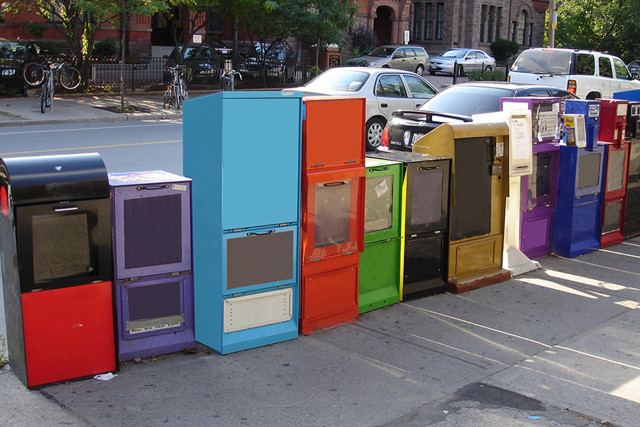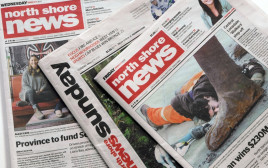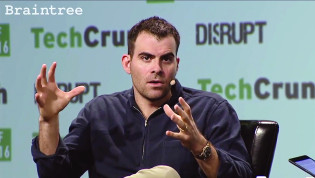Where’s local news in the Facebook age?
As community newspapers disappear and mainstream media struggles, most people are getting their local news from Facebook—and that’s a problem.

The Liberal government’s newspaper bailout will undoubtedly help big media players like Postmedia or The Toronto Star, but it will likely have little to offer the hundreds of smaller local newspapers in Canada. As many of these community newspapers shrink in size or get closed down entirely, a lot of Canadians are finding that the only remaining place to find out what’s happening in their hometown is Facebook.
North and West Vancouver, the “North Shore” suburbs separated from downtown Vancouver by two bridges and the Burrard Inlet, are no exception. Although occasionally stories reported in our local community newspapers make it across Burrard Inlet, the reality is that we’re often forgotten by Vancouver’s big corporate media. Vancouver-based TV and radio stations offer only limited space for news from the suburbs, and three years ago Postmedia’s Sun and Province merged their newsrooms, leaving the remaining staff to write each story twice–once for each newspaper.
Based in North Vancouver, the North Shore News tabloid has operated since 1969. It recently cut back from three to two issues each week, and the rumour is that it might soon become once weekly. Its focus has shifted towards the higher-income homes in West Vancouver and to a Chinese edition.

North Vancouver’s North Shore News has been operating since 1969. The local tabloid has reduced its frequency to twice a week. (North Shore News).
For many years the North Shore News’ competition was a weekly called The Outlook, but that paper was closed by Glacier Media in 2014. Last year it was replaced by The Global Canadian, a spirited new broadsheet that managed to distribute a monthly edition last year but has now moved to a web-only format. And there are doubts as to whether the North Shore has enough sources of ad revenue to support two papers.
With only a limited amount of professional media available in North Vancouver – and given that it’s not entirely known how many people actually read the paper that gets dropped at their door – people increasingly turn to social media for local news. While the politically savvy might gravitate towards Twitter, a large part of the population gets their local news from Facebook. Or, more accurately, Facebook is where people share stories, whether from local media or one another.
You might also like:
Stay informed, subscribe to the FRIENDS newsletter
You are a few fields away from becoming a friend.
When people relied on a community paper for local news, there was a trust in the truth of what was written, and although individuals might have had different points of view, they all drew from the same pool of information. When Facebook and its groups are your only sources of local news, that trust in shared knowledge all but disappears.
Facebook is not a journalistic enterprise, and it is struggling to prove that it offers more than “fake news.” The new Facebook Journalism Project Community Network is offering small grants to 23 groups “to develop a meta-community for local news publishers.” Rather than just paying journalists to report local news, the project will “fund community-building.”
Regardless of their new efforts and claims, Facebook does a poor job of acting as a news source. Despite increasingly complex algorithms, and an increasingly large staff of living, breathing humans overseeing the algorithms, it is still the case that “news” items on Facebook can appear from pretty much any source, and that memes camouflaged as news items circulate with abandon. The problem is that the average reader isn’t equipped to judge what’s real and what’s fake.
Adding to the problem is another of Facebook’s algorithmic choices: it selects which stories you see and which ones you don’t. Your friends and neighbours may be seeing an entirely different set of memes and “news stories,” even if they share your interests. If a journalist or publisher posts a story directly to Facebook, they largely have no control over who sees it. When the North Shore News distributes a flyer-stuffed paper to every house on the North Shore, they can be sure that every person has the opportunity to read the news they publish. If they post the same stories to Facebook, they can’t know which people will have a chance to read them, or even how Facebook makes that decision.
Last year, Adam Mosseri, Facebook’s head of News Feed, described News Feed algorithm changes by saying, “Because space in News Feed is limited, showing more posts from friends and family, and updates that spark conversation, means we'll show less public content, including posts from publishers or businesses.” If you’re a news organization, your breaking story will be less likely to appear in someone’s News Feed than a picture of their Aunt Gladys.
If you’re a news organization, your breaking story will be less likely to appear in someone’s News Feed than a picture of their Aunt Gladys.
Publishers are handicapped by Facebook, but regular community groups also face the challenge of getting their information and pages to the people who most need to read them. Facebook’s search tool does a poor job of helping you find local content, and many groups trying to play an active role in the life of North Vancouver limit their audience by closing access to their pages to keep out trolls and limit online abuse.
Within local groups, the quality and accuracy of what is posted can vary dramatically. The people running the groups, and the members who post to them, are not trained journalists, and any fact-checking falls to a volunteer group member who researches claims and posts corrections.

Facebook’s Adam Mosseri defended the News Feed algorithm changes, saying that users would see more posts from friends and family "and updates that spark conversation" and fewer from publishers or businesses.
Small local newsmakers face one more challenge. As much as The Globe and Mail, The Toronto Star and even the CBC feel constrained by tight budgets and a reduced workforce, they still enjoy a national reach and reputation. They set the news agenda. Unfortunately, “national” means stories from the country’s nine or 10 biggest cities, and next to nothing from the suburbs, small towns and rural areas that community publications have traditionally served.
Local media are at a disadvantage because the national reputation of media giants means that their stories will tend to appear on your Facebook page before, or instead of, the stories from down the street.
Local media are at a disadvantage because the national reputation of media giants means that their stories will tend to appear on your Facebook page before, or instead of, the stories from down the street.
The big media bailout may be a good thing for the big publishers, but by strengthening them it’s just possible that it will be one more step in driving local media out of business.

